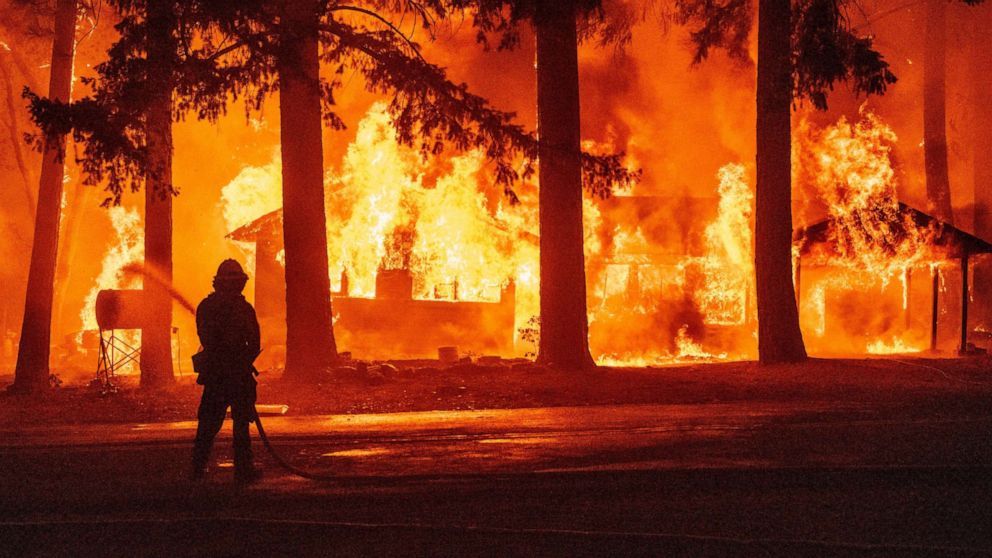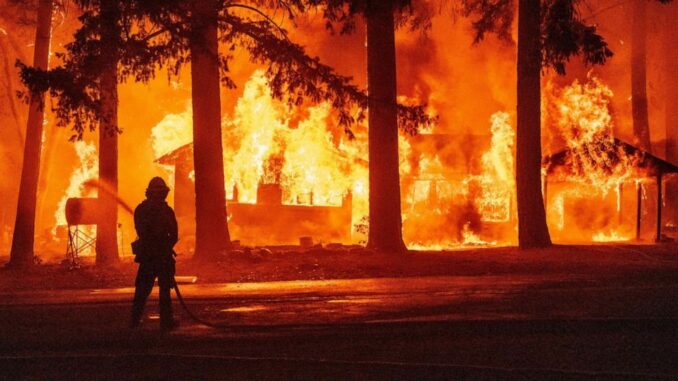

The Dixie fire in the Indian Falls neighborhood on July 24, 2021.
Jan. 8 — In the first week of 2022, California fire officials finally placed the blame for the massive Dixie Fire that raged in northern California from the end of last July through the end of October.


The Dixie fire in the Indian Falls neighborhood on July 24, 2021.
The fire, larger than Rhode Island, burned over 950,000 acres across five counties, destroyed the towns of Greenville and Canyondam, killed one firefighter and spread poisoned air as far as Colorado.
The culprit? A faulty Pacific Gas & Electric (PG&E) power line.
At the present moment, more than 30,000 PG&E customers of Sierra, Placer and El Dorado Counties in California have been without power since Dec. 27 following a winter storm. People are not expected to have power fully restored until Jan. 11 — a full two weeks without power! For those without access to another form of adequate heat and alternative food storage methods, this presents grave and dangerous circumstances.
To add to the list of PG&E’s harmful actions to people, a lawsuit against the company was filed in recent weeks by Emanuel Lankford, a Black employee, alleging discriminatory and retaliatory practices against his job mobility and security.
Lankford, who has worked as a PG&E substation supervisor for more than 15 years, said in a Jan. 5 interview: “It’s been one thing after another: being overlooked for promotions, being retaliated against for speaking up. . . . I interviewed for the manager position . . . it was not awarded to me. It instead went to a white female who has no substation experience.” (tinyurl.com/2fd369xp)
Another Black PG&E employee, Cynthia Farr, filed a lawsuit for discrimination in October 2021. Farr was fired in retaliation for making discrimination claims against the company, and she was disciplined for reaching out to an electrical industry union regarding her treatment. The racist discrimination and harassment against Farr, documented as far back as 2017, hit an extreme in 2018, when Farr was ordered to remain in the open while the rest of the staff was sent to hide behind bulletproof glass during the threat of an active shooter.
Capitalist crimes
Corporate misconduct is not news, and PG&E is no stranger to being unmasked for such misconduct. But the scope of its misconduct is absolutely monumental.
This misconduct carries adverse effects plaguing all of northern California and putting much of the rest of the West Coast at risk. We must continually make the link that it is corporations driving climate disasters forward.
Plenty can be said in theory about the evils that corporations enact by way of exploitation and expansion. But looking at such a company as this California behemoth, concrete evil can be seen in more visible ways, like the large-scale destruction of land in massive acreages — and of lives in the hundreds.
This new streak of transgressions from the utility giant represents momentum carried forward from its past. PG&E’s highlights of the last decade are nothing short of pure horror. In San Bruno, California, in 2010, a company gas pipeline exploded, killing eight and injuring dozens more. The Butte Fire of September 2015, starting in Amador County, California, was caused by one of its power lines, and killed two people.
The company was blamed for the electrical malfunction that caused the Oakland Ghost Ship warehouse fire in December 2016, which killed 36 people. PG&E’s power lines were again at fault for 13 of the fires in northern California in October 2017, when 250 fires killed 44 people.
The recent catastrophic Dixie Fire — which PG&E was found culpable for — was the second largest in California’s history. The utility company was also guilty of the state’s worst: The 2018 Camp Fire, California’s deadliest and most destructive fire, killed 85 people and displaced 90% of the population of the town of Paradise, nearly completely destroying it and three other towns — Concow, Magalia and Butte Creek Canyon.
The cause? Again, a faulty PG&E power line.
After all these atrocities, in recent weeks PG&E has announced it is raising its utility rates by over 9%. The company has put out the following public relations reason: to help fund wildfire prevention and grid safety.
But it is precisely the company’s unsafe practices and total negligence that have caused the bulk of the decade’s most devastating California wildfires. It is the company, with its enormous resource pool of capital, that needs to shoulder the cost and duty of maintenance and repair, not its customers.
More than a slap on wrist needed
Admonishing Pacific Gas & Electric does not satisfy its crimes. Fining them a hundred million dollars or so for each fire is a slap on the wrist for a company worth $97.8 billion in assets.
The given solution has been posited many times to the company: Bury the power lines. The company has made many empty promises to act to this effect and has slowly started the process of burying some lines, but it does not prioritize the project and refuses to repair and maintain equipment in the meantime.
The reason: Burying lines is a costly endeavor; and despite its utmost necessity, it is more profitable for the corporation to refuse or delay, than for it to see a dip in its short-term profits.
Such a mindset would require redistribution and collective ownership.
PG&E is an excellent example of the sheer danger involved in allowing a private entity to control the resources that should belong to the people. An electrical company should be safe, up-to-date and reliable, regardless of profitability. Its workers would agree, and its customers would agree. Two-thirds of the utility’s constituency would be in agreement, but capitalists depend for their existence on the profit element.
For them it’s a worthy sacrifice to raze entire towns, leave people stranded without power, devalue their skilled Black employees to continue to squeeze cheap labor out of them and scorch whole forests to the ground — as long as that means capitalist profits will ride high in the short term.
Boston, April 20, 2025 The leadership of the Democratic Party nationally and especially in Massachusetts…
Hamas – Islamic Resistance Movement made the following call, “Gaza cries out to you —…
The centennial of the birth of Malcolm X, also known as El-Hajj Malik El-Shabazz, is…
In a courageous act of solidarity with the Palestinian people, a Moroccan port workers’ union…
Buffalo, New York A large group of demonstrators marched on the Buffalo ICE (U.S. Immigration…
In the 1950s, when Japan and much of Europe was in ruins, the U.S. accounted…